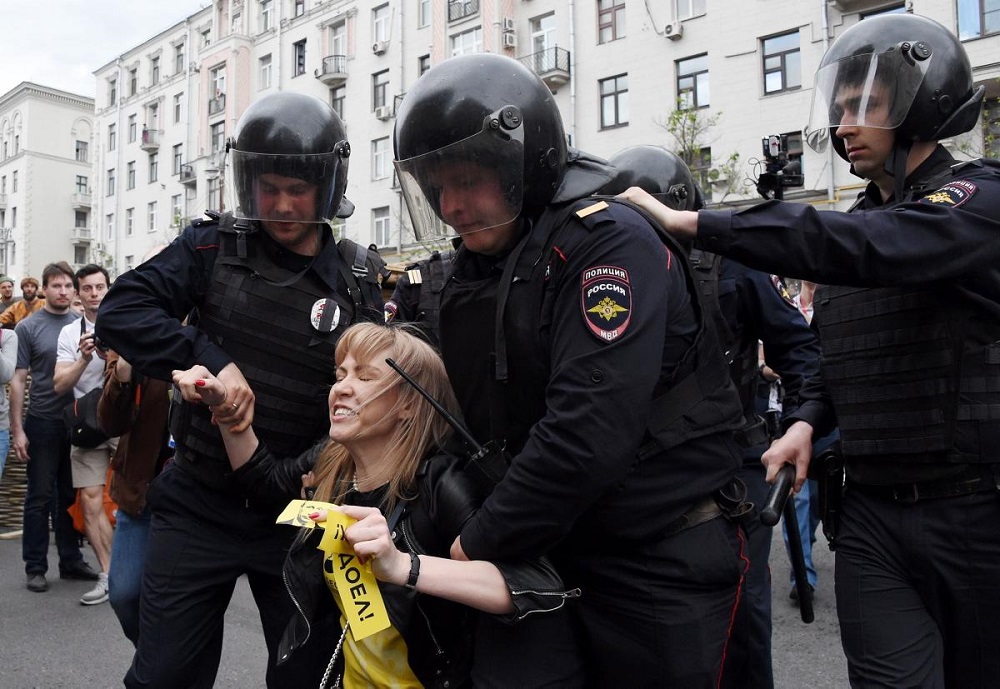Moscow announced on Tuesday that it will disregard calls by the United States to release Russian protesters, who were detained on Monday during anti-government rallies that also saw the arrest of opposition leader Alexei Navalny.
The United States condemned Russia’s crackdown on anti-corruption protesters on Monday, calling on Moscow to release “peaceful” demonstrators detained by the police.
“We disagree when the question is put this way. This is not the sort of calls we should be listening to,” Kremlin spokesman Dmitry Peskov told a conference call with reporters.
He said the authorities had not acted against protesters who had agreed their actions in advance.
“As for those who indulged in provocative actions, breaking the law, in this case the authorities took action against them in full compliance with our legislation,” said Peskov.
He also said that Russia took a negative view of a US Senate deal on wider sanctions against Russia.
US senators reached an agreement on Monday on legislation imposing new sanctions on Russia, including a provision that would prevent the White House from easing, suspending or ending sanctions without congressional approval.
Tens of thousands of protesters held anti-corruption rallies across Russia on Monday in a new show of defiance by an opposition that the Kremlin had once dismissed as ineffectual and marginalized.
More than a thousand were arrested.
Navalny, who was seized outside his Moscow residence while heading to the rally in the city center, was sentenced to 30 days in jail several hours later.
The Moscow protest was the most prominent in a string of more than 100 rallies in cities and towns stretching through all 11 of Russia’s time zones — from the Pacific to the European enclave of Kaliningrad — with many denouncing President Vladimir Putin.
Thousands of angry demonstrators thronged to Tverskaya Street, a main avenue in the capital, chanting “Down with the czar” and singing the Russian national anthem.
The protests coincided with Russia Day, a national holiday that this year brought out historical re-enactors, some of them dressed in medieval costumes. At one point, the Moscow demonstration featured an unlikely scene of about 5,000 protesters rallying next to an enclosure with geese, a medieval catapult and bearded men in homemade tunics and carrying wooden shields.
The re-enactors watched the rally before riot police broke up the crowd and randomly seized the protesters.
Over 800 people were arrested in Moscow, while in St. Petersburg, about 500 were forced into police buses at an unsanctioned rally that drew up to 10,000 people. Navalny was taken to court Monday evening and sentenced to 30 days in jail shortly after midnight for repeated violations of the law on public gatherings.
“The scope of the rallies was amazing, and so many people came out,” Navalny told reporters shortly before he was sentenced, point to protest rallies held in towns which have not seen any public show of discontent for decades.
In his trademark humor, Navalny lamented on Twitter shortly before he was led out of the courtroom that he would have to skip a Depeche Mode concert while he is in jail.
Navalny had called the anti-corruption demonstrations, and they drew crowds of several dozen to the 10,000 in St. Petersburg. Some of the rallies were sanctioned by authorities and peaceful, but police cracked down brutally on others.
Although it was not immediately clear if Monday’s protests were larger than those in March, they underlined the deep dismay with the government. Putin is expected to seek another term in 2018, and Navalny has already announced his intentions to run.
Moscow officials had agreed to allow Navalny’s rally, but late Sunday, he said official interference had prevented contractors from erecting a stage at the agreed-upon venue and instead urged demonstrators to gather on Tverskaya Street, which was closed to traffic for the Russia Day festivities.
Most of the Moscow protesters appeared to be under 30, although there was a sizeable number of middle-aged people and couples with children.
With opposition sentiment strong or even growing, authorities appear to be seeking a strategy to undermine the opposition without provoking more animosity.
Authorities allowed the unsanctioned rally to proceed, although riot police cut the crowd in half and began pushing the lines while grabbing some people from the crowd. Some of the arrests were violent with police using batons and dragging people along the street.
Navalny rose to prominence for detailed open-source investigations of government corruption. That was a key issue Monday for protesters, particularly his report on vast wealth allegedly acquired by Prime Minister Dmitry Medvedev.
